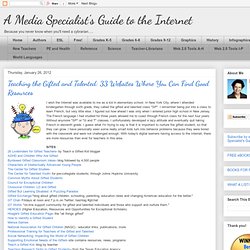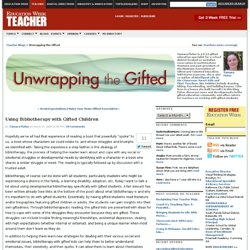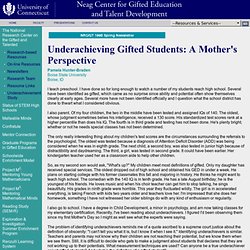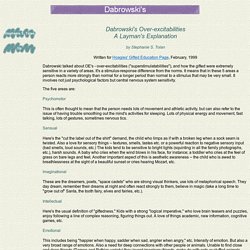

Are You Left or Right Brain? Global Center for Gifted and Talented Children. Teaching the Gifted and Talented: 33 Websites Where You Can Find Good Resources. I wish the Internet was available to me as a kid in elementary school.

In New York City, where I attended kindergarten through sixth grade, they called the gifted and talented class "SP". I remember being put into a class to learn French, but very little else. I figured out how ahead I was only when I entered junior high school in New Jersey. The French language I had studied for three years allowed me to coast through French class for the next four years. Without anymore "SP" or "G and T" classes, I unfortunately developed a lazy attitude and eventually quit taking French in eleventh grade. LESSON PLANS41 Ways to Go Beyond the Book Report Edsitement- from the National Endowment for the Humanities Gifted and Talented Education Lesson Plans Helpful Sites for Gifted Students Lesson Plan Resources- from Davidson GiftedMrs.
Academically and Intellectually Gifted Students. Using Bibliotherapy with Gifted Children - Unwrapping the Gifted. Hopefully we’ve all had that experience of reading a book that powerfully “spoke” to us, a book whose characters we could relate to, and whose struggles and triumphs we identified with.

Taking this experience a step farther is the strategy of bibliotherapy, the process of helping the reader learn about and cope with any social or emotional struggles or developmental needs by identifying with a character in a book who shares a similar struggle or need. The reading is typically followed up by discussion with a trusted adult. Bibliotherapy of course can be done with all students, particularly students who might be experiencing a divorce in the family, a learning disability, adoption, etc.
Today I want to talk a bit about using developmental bibliotherapy specifically with gifted students. A fair amount has been written already (see links at the bottom of this post) about what bibliotherapy is and why it's important to do with gifted students. . * Who in the book do you identify with and why? Challenges. Characteristics. Overexcitabilities. Overexcitabilities Used to Predict Giftedness. 10 Social & Emotional Needs of the Gifted. NRC/GT—Spring '98 Newsletter-Underachieving Gifted Students: A Mother's Perspective. Pamela Hunter-Braden Boise State University Boise, ID I teach preschool.

I have done so for long enough to watch a number of my students reach high school. Several have been identified as gifted, which came as no surprise since ability and potential often show themselves clearly at early ages. Several more have not been identified officially and I question what the school district has done to thwart what I considered obvious. I also parent. All studies comparing the characteristics of the achiever with those of the underachiever indicate that negative self-concepts are the central trait distinguishing underachievers from those who are achieving commensurate with their ability. Coil (1992) believes that "while signs of underachievement often begin by third or fourth grade, middle school or junior high usually marks the highest point of consistent underachievement" (p. 2). . . . come to realize that underachievers want school to be different.
References Clark, B. (1997). Coil, C. (1992). Home Page. Twice Gifted. Parenting Guide Gifted Children Ireland. Exquisite Minds: Gifted and Creative Children « Support for Educators and Parents of Gifted and Creative Children "The problems that exist in the world today cannot be solved by the level of thinking that cr. Dabrowski's. By Stephanie S.

Tolan Written for Hoagies' Gifted Education Page, February, 1999 Dabrowski talked about OE's - over-excitabilities ("superstimulatabilities"), and how the gifted were extremely sensitive in a variety of areas. It's a stimulus-response difference from the norms. It means that in these 5 areas a person reacts more strongly than normal for a longer period than normal to a stimulus that may be very small.
The five areas are: Psychomotor This is often thought to mean that the person needs lots of movement and athletic activity, but can also refer to the issue of having trouble smoothing out the mind's activities for sleeping. Sensual Here's the "cut the label out of the shirt" demand, the child who limps as if with a broken leg when a sock seam is twisted. Imaginational These are the dreamers, poets, "space cadets" who are strong visual thinkers, use lots of metaphorical speech. Intellectual Here's the usual definition of "giftedness. " Emotional. 15 facts about Creativity - Think Jar Collective Post. Respondo! - Creative Literature Response Questions.